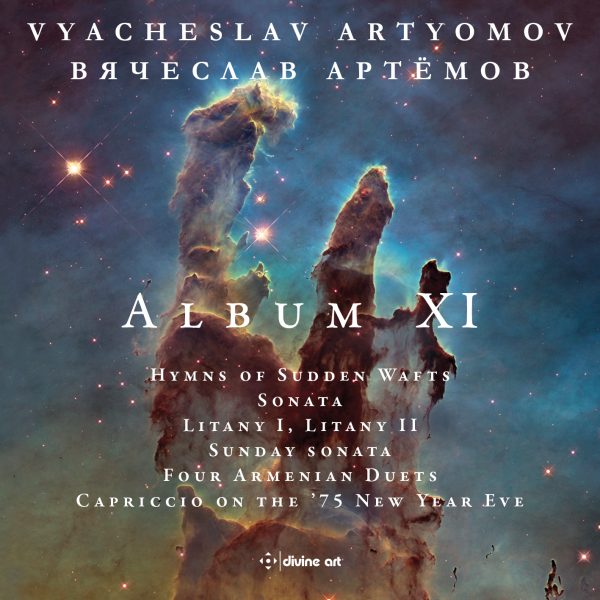Fanfare
Previous albums of Vyacheslav Artyomov’s music released by Divine Art have had catchy titles, based on one of the works that they included—The Way to Olympus, A Symphony of Elegies, and the like. This time we get Album XI, presumably because this is the label’s 11th Artyomov release and it is something of a grab bag. (Initially I thought the CD was dedicated to the President of the People’s Republic of China, but that does not appear to be the case.)
All kidding aside, Album XI is a collection of the composer’s chamber works, some composed as early as 1966, when he was in his 20s (the Sonata and the Four Armenian Duets), and the most recent from 1983 (Hymns of Sudden Wafts—a very Artyomovian title).
The composer’s penchant for unconventional instrumentation comes to the fore in several of these works. Litany I, for example, is for a quartet of saxophones, and Litany II is for a quartet of flutes. The Capriccio, which closes this CD, is for two saxophones and an odd array of percussion (including flexatone), and the Hymns, which open it, are for saxophone, harpsichord, and piano. The Hymns are my favorite work on this CD, as they most effectively combine the composer’s tastes for mysticism and gentle avant-garde experimentation. The first Hymn, marked Allegro, is only three minutes long, and it flirts with Messiaen in its writing for piano. It serves as an introduction to the Lento second Hymn, which is almost eight times longer, and sounds like what The Unanswered Question might have sounded like had Charles Ives lived in the Soviet Union instead of selling insurance in New England. On the other hand, the piano arpeggios in its middle remind me of Morton Feldman—no bad thing! Becalmed yet moody, it appeals to me in a way that is both rational and emotional. This work is meant as a nature piece—or so it says in the booklet note—but don’t expect musical depictions of birds twittering and brooks rushing. Artyomov has more cosmic fish to fry.
The Sunday Sonata is of interest because there are so few sonatas for bassoon and piano, and this is a good one. Artyomov wrote this as a competition piece in 1977, and I want to say that it challenges the bassoonist’s interpretive skills as much as, if not more than, his or her technical skills. Virtuosity takes a back seat to the performers’ ability to weave together a meaningful narrative from this series of bardic pronouncements. The Sunday Sonata was dedicated to the performers who play it here, and I can’t imagine how anyone could play it better.
The Four Armenian Duets are a souvenir from one of the composer’s frequent visits to Armenia during the Soviet era. These works are striking for the way in which the composer blends his personal style with Armenian folk styles. The writing for soprano and mezzo-soprano, much of it polyphonic, is most effective—plaintive and earthy—and the two performers (sisters?) make a strong impression.
These recordings, some live and others studio-based, were made over a period of more than two decades, and they have the ring of authenticity. All of them were remastered in 2020 in England, so everything sounds fresh and up-to-date, and nothing jars.
Artyomov turns (or has turned) 80 this year. His photograph on the booklet’s back cover might not be recent, and neither are any of these works or recordings, but his music has staying power, perhaps because of its spiritual strength. Conductor Teodor Currentzis called him the “Bruckner of the 21st century,” and even in these chamber works, one can hear the massiveness and depth of his imagination. Is this the best place to start exploring his music? Probably not (I am partial to his Requiem), but if you have not started exploring it, please consider doing so soon.
@divineartrecordingsgroup
A First Inversion Company
Registered Office:
176-178 Pontefract Road, Cudworth, Barnsley S72 8BE
+44 1226 596703
Fort Worth, TX 76110
+1.682.233.4978












